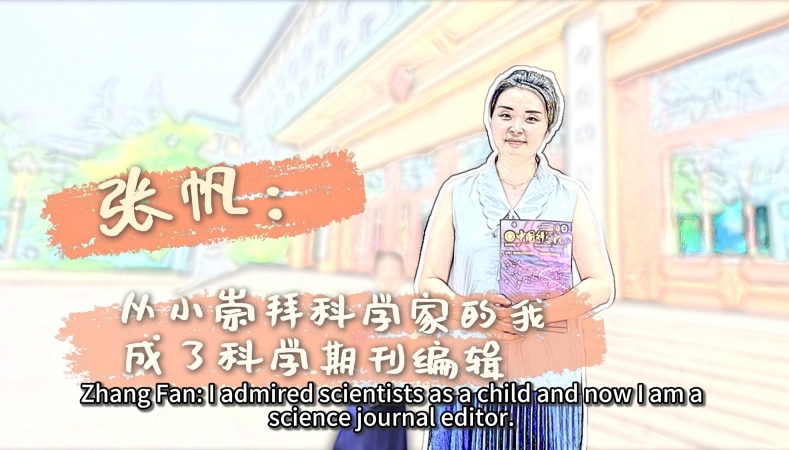Scientist Spirit Leading Sci-tech Advancement
By YU Haoyuan & BI Weizi
Science and technology capabilities of China have become globally influential over the past decades thanks to the unremitting efforts of generations of scientists and the enduring spirit that they passed down.
Serving the nation with dedication
Chinese scientists have an illustrious tradition of serving the country. Their efforts made it possible to explore the boundless space with the Shenzhou manned spacecraft, plumb the deep sea with the Jiaolong manned submersible, and observe the distant universe with the Five-hundred-meter Aperture Spherical radio Telescope (FAST).
The history of China's scientific development is full of dedicated scientists who stand out for their contributions.
Aerospace engineer Qian Xuesen gave up a successful career in the U.S. to return to China and became the "Father of Chinese Rocketry." Nan Rendong, the chief scientist and chief engineer of the FAST project, implemented it while battling cancer.
Scientists like Deng Jiaxian, Huang Xuhua, Huang Danian and Liu Yongtan, who made great contributions to China's sci-tech progress, shared a common spirit. They were patriotic, innovative and dedicated, and mentored the next generation.
Benefiting the world with innovation
The scientist spirit also emphasizes serving socioeconomic development and the people.
As the world undergoes major changes unseen in a century, science workers are embracing the challenges brought about by the new wave of technological and industrial transformation and ensuring that their achievements benefit everyone.
Chinese agronomist Yuan Longping, known as "the father of hybrid rice," developed the first hybrid rice varieties in the 1970s. The rapid increase in crop yield enabled China to become self-sufficient in food, feeding its people — or 20 percent of the global population — though it has only nine percent of the world's arable land.
Yuan and his team donated crucial rice strains to the International Rice Research Institute in 1980, which provided a Chinese solution to the worldwide food shortage.
Phytochemist Tu Youyou proved the effectiveness of traditional Chinese medicine (TCM) in modern research. Following TCM texts, she extracted artemisinin from the herb wormwood to treat malaria, a revolutionary herbal therapy that has been particularly impactful in Africa, where malaria is a major health issue. Her work has significantly reduced the malarial mortality rate across the continent, saving millions of lives, especially those of children. The Nobel Prize Committee, which honored her in 2015, includes her among the "women who changed science."
The work of Yuan and Tu has made them global icons of the scientist spirit. This spirit has contributed immensely to building a community with a shared future for all.
Scientist spirit in new generations
Although Nan Rendong passed away, his spirit continues to inspire "star chasers" in Guizhou province in southwest China where FAST is located. His student Jiang Peng now leads the team operating the telescope and they have made numerous world-class scientific achievements. Thanks to observations using FAST, researchers have published 11 high-level papers in Nature and Science.
Several research teams named after veteran scientists have inherited their spirit, dedicating themselves to innovative research and achieving remarkable results. A team that made a geological and paleontological study on the Qinghai-Xizang Plateau, summarizing the basin evolution of the North Qiangtang Block, a terrane in Xizang autonomous region, was named after geologist Li Siguang. The world's first high-definition lunar geological atlas was drawn by a team named after renowned lunar scientist Ouyang Ziyuan. A highland biology research team, named after zoologist Xia Wuping, assembled high-quality chromosomal-level reference genomes for wild and domestic yaks.
Many Chinese scientists have gained international recognition for their contributions to global scientific research and technological innovation.
Xue Qikun, China's top science award winner this year, achieved breakthroughs in topological insulators and quantum physics, revitalizing China's research in these fields. Pan Jianwei led the successful launch of the quantum science experimental satellite Micius and his work laid the foundation for a global quantum communication network. Shi Yigong advanced structural biology in China and his research is crucial for understanding human disease mechanisms. Yan Ning discovered the structures and functions of important proteins in structural biology and helped bolster China's standing in biomedical research.
Leaving an enduring legacy
From launching the first Chinese satellite 50 years ago to sending three taikonauts into space with Shenzhou 18, Chinese scientists have continued to conquer new frontiers, including sending a rover to Mars and bringing back samples from the far side of the Moon. The scientist spirit in these endeavors has become a legacy for future generations, igniting their passion for science and technology.
China's scientific literacy has significantly improved. By the end of 2020, 10.56 percent of the people had science literacy, which increased to 14.14 percent by 2023. The number of science popularization professionals and volunteers has also grown, reaching 1.99 million in 2022, up 9.26 percent from 2021. This has kept the spirit of science inheritance flowing.
The scientist spirit inspires China's sci-tech workers to strive for new heights. According to a report from the Institute of Scientific and Technical Information of China last September, Chinese scientists published 16,349 papers in top journals in 2022, representing 30.3 percent of the global total. China also maintained its leading position globally in the number of academic papers published in the world's most influential journals and held the second place for highly cited papers. These achievements have contributed significantly to the world of science.
Such milestones reflect China's gains in science popularization and education and the proactive role played by the numerous scientists and those who raise awareness about science. The trends indicate that this spirit will be carried on, encouraging further sci-tech development and promoting global cooperation in innovation.


